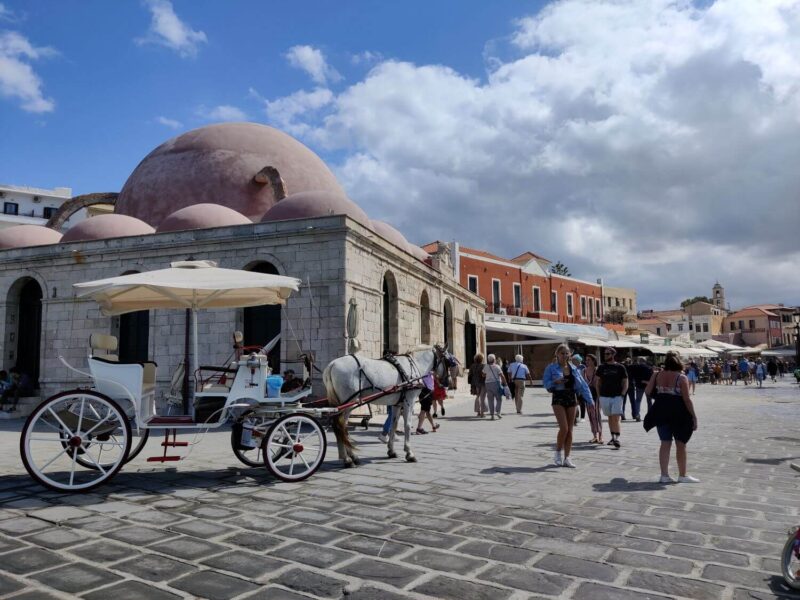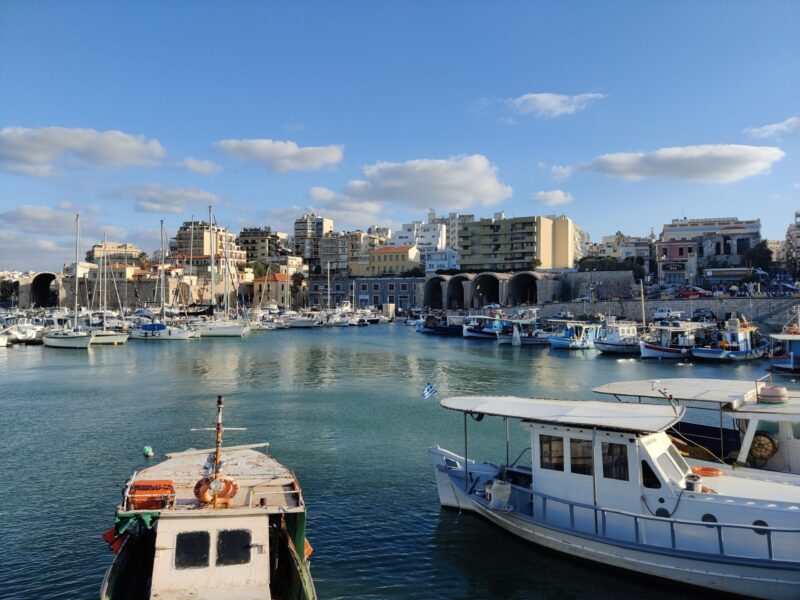Greece
Travel Guides
Welcome to Greece, one of the most popular destinations in Europe, and for good reason. With rugged coastlines, crystal clear waters, delectable food, tons of historic ruins and landmarks, and the welcoming smiles of the warm-spirited locals, there are countless reasons for wanting to visit Greece. Our collection of Greece travel guides are packed with all the information you need to travel to some of the best destinations in Greece.
From the urban sprawl of Athens to quaint uninhabited islands, catching a glimpse of historic, awe inspiring, Greek ruins is possible almost anywhere in Greece. With exceptionally reasonable prices, compared to most destinations in Europe, Greece is an accessible destination for almost any traveller and offers something for everyone, too. It’s hard to match the warm, friendly smiles of the locals, the meze spreads of small taverns, the turquoise waters and stunning beaches that are spread throughout Greece. With over 1,200 islands to explore, there’s always a reason to return.
Greece Travel Guides - Where Do You Want To Go?
Top Greece Travel Tips
How to get to Greece
Flights – Greece has become a popular and sought-after holiday destination within Europe. Known for its clear waters, white-washed houses and laid-back vibe, Greece and its many islands have found a place on many travellers’ bucket lists. So, it’s not surprising that Greece is now fairly easy to get to by air. The national airline in Greece is Aegean Airlines, which connects Athens, the capital city and main airport in Greece, to many European countries and cities and even some international destinations too. Sky Express and Olympic Air are smaller Greek airlines that operate some flights to and from European destinations, as well as many connecting flights from Athens to the Greek islands. Many other airlines operate flights to and from Greece across Europe and internationally. From March until November it is possible to fly direct from Europe to some of the larger and most popular islands in Greece such as Crete, Rhodes, Santorini, Kos and Corfu. From November to March, you will need to connect to Athens for any of the Greek islands. To check all the flight routes and options available, use Skyscanner. They show options available and you can benefit from useful tools such as the flight tracker, which allows you to track the price of a chosen flight and book it at its least expensive price.
Trains – Trains operate in mainland Greece only, not on any of the Greek islands. There isn’t a large train network in Greece but the main route that visitors use is Athens – Thessaloniki. Trains are generally quite comfortable and pleasant. Two international train routes operate in and out of Greece which is the Thessaloniki-Belgrade (Serbia) train and the Thessaloniki-Sofia (Bulgaria) train. You can check train routes, times, prices and book tickets for trains in Greece at TrainOSE, the Greek train website
Bus – The bus is a common way to get around Greece and some international bus routes connect Greece to some neighbouring Balkan countries. These routes change regularly but are commonly Athens-Sofia, Athens-Istanbul and a few others. Most of these buses depart from Athens or Thessaloniki but will take quite some considerable time to reach your destination
Useful tips for getting around Greece
Greece conjures up all sorts of images of idyllic beaches, pretty villages and delicious food. Many of the islands are quite different to one another two, so the country is perfect for exploring. So what’s the best way to travel around Greece? Well, we’ve done some research to give you the rundown on the main modes of transport to get around Greece and you can read our guide on how to get around the Greek islands for more detail on that too. So, here’s how to explore Greece:
Trains – While the trains that do exist in Greece are great, there aren’t many of them. Trains only operate in mainland Greece, not on the Greek islands. There are a few intercity routes and suburban routes for Athens and some of the other larger cities, but that’s about it. One of the most common train routes used in the country, and sometimes by visitors too, is the Athens-Thessaloniki line, which offers great views and a comfortable train ride between the two cities in 4 hours. You can find out more information about trains in Greece on the Greek train website TrainOSE
Bus – Buses are a common way to get around Greece, between cities on the mainland, between cities and towns on larger islands and general bus networks that operate in urban areas and on most islands. They can be a very useful tool in exploring islands, especially if you’re relying on public transport. Buses and coaches are generally quite comfortable and inexpensive. You can visit and check the website for the national bus company KTEL to see timetables, prices and route information
Car – Some of the rural areas of Greece and the Greek islands are best explored by car. Cars drive on the right-hand side of the road in Greece and drivers can be a little less polite and less careful than in some European countries, so be wary of this. You must wear your seatbelt by law in Greece and the speed limit on the motorway is 130 kph. In built-up areas, the speed limit is generally 50 kph, unless indicated otherwise. On the Greek islands, you are better off renting a car on each island, than taking the same car with you on the ferry, because of the price. There are several car rental companies on most islands, so there should be no problem in renting a car quickly
Domestic flights – Flying between cities and islands is one of the most common ways to get around Greece. The national airlines in Greece operate many flights between Athens and islands with an airport, but getting flights from one island to another is much more difficult. So, if you’re planning to fly from Athens to another city or island that has an airport, you should have no problem but if you plan on flying from one island to another, you’re better off taking the ferry. You can check Skyscanner to see the various domestic flight options throughout Greece
Ferry – Travelling by ferry is one of the best and most scenic ways to get around Greece. A large number of islands in Greece means that the ferry is one of the most popular and most used forms of transport in the country. Ferries also run between islands, while flights generally do not. There are lots of ferry routes that can offer visitors the chance to see multiple islands in one trip, we’ve covered that in more detail in our article on Greek island hopping. The ferries in Greece are operated by several companies, some of which cover most areas and many which cover a specific island group. Ferries are generally quite comfortable, large and have kiosks selling food and drink on board. Sometimes they run like clockwork and sometimes there are delays, so they aren’t always reliable. We recommend booking ferries in Greece through FerryHopper, which is a great website and app covering ferry routes in Greece in a super easy format with useful tools such as the route map, which shows all of the available ferry routes in Greece
Local language and phrases in Greece
The language in Greece is Greek, but English is widely spoken, particularly in more touristic areas, hotels and restaurants. Although Greek can look a little daunting to read and understand, speaking the language and understanding it is easier. The Greek people highly appreciate it when visitors to the country make an effort to say some Greek, it’s respectful for an travellers to try. Some useful Greek phrases and words to help you on your Greek adventure are:
Hello or Bye – Yassou (Yah-soo)
Thanks – Efharisto (eff-kah-ri-stoe)
Please – Parakalo (para-kah-loe)
Yes – Nai (neh)
No – ochi (oh-hee)
Where is the WC? – Pou einai i toualeta? (Poh-ee-nay ee tua-leh-tah)
Greece travel tips
– Greece is a safe country to travel and live in and is suitable for all travellers. As with any popular tourist destination, be wary of your personal belongings at all times and watch out for scams, particularly in the capital, Athens
– Greece uses the type C plug, with 2 round pins which is used across most of Europe. If you buy a European travel adapter, this will work in Greece
– Healthcare in Greece isn’t quite as good as some European countries and we strongly recommend that you take out travel health insurance before visiting Greece (as you should with any trip!). One of our favourite travel health insurance companies is SafetyWing, which offer great value insurance with optional extras and for long periods if required
– Do not flush toilet paper down the loo in Greece
– The water is suitable to drink out of the taps in most areas in Greece, however, on some islands it is not, check our destination specific guides for more info
– Dial 112 in an emergency in Greece
– The currency in Greece is the Euro (€)
This site uses affiliate links. When you click on a link and purchase an item, we may be compensated on qualifying purchases. However, this is at no extra cost to you. See our affiliate disclosure for further information.
Our Latest Greece Travel Articles
Greece walking tour videos
See all of our Greece walking tour videos, and more destinations, on our Youtube Channel. We have maps to accompany our walking routes available on our specific destination travel guides. You can download the map to your Google Maps and follow our route and see the landmarks on the way





